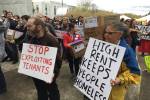Keep government out of housing
Leave it to government to find a reason to look back longingly at the Great Recession.
Last month, state Sen. Julia Ratti, D-Sparks, chaired the first meeting of the Legislature’s interim Committee on Affordable Housing. The committee’s purpose is to determine “methods to increase the availability of affordable housing.” At its first meeting, the panel heard six hours of testimony. One of the government-produced reports submitted to the members contained this gem.
“Although unemployment sky-rocketed, the Great Recession produced a glut of housing, much of it affordable to middle- and low-income households,” read the Housing Division’s 2017 Annual Housing Progress Report. “Since that time Nevada home prices have been rebounding.”
If only Nevada could return to the glory days of 13 percent unemployment and foreclosures on every street corner.
Are there really people who want to return to the 2010 economy, or is this another case of government looking to stick its nose where it doesn’t belong?
There’s much evidence to support the latter.
It starts with defining how much an individual needs to earn to afford housing. The committee considered a report from the National Low Income Housing Coalition. Its conclusion was that a Nevada household must earn almost $38,000 a year or $18.26 per hour to not be “cost-burdened” by housing.
Really? As many young adults can tell you, there’s a simple way to earn less than $38,000 and not spend more than 30 percent of your income on rent. It’s called roommates.
Rising rental prices are actually the very thing needed to lower prices. Increased home values and rents signal to builders that they should build more housing units. The best way to drive housing prices lower — without sabotaging the economy — is to increase the supply. But the tendency of too many interventionists is to embrace central planning such as mandating rent controls. Those are disastrous in the long run.
The Wall Street Journal recently reported on a working paper by Stanford economists who studied rent-controlled apartments in San Francisco from 1995 to 2012. Rent control increased the likelihood that tenants would stay put by nearly 20 percent. But it “also found that rent control hurt the city overall by making landlords more likely to convert their apartments to other uses and deplete the housing stock, leading to a permanent citywide rent increase of 5 percent.”
If state Sen. Ratti wants to increase Nevada’s stock of affordable housing, she should direct her committee to identify and remove existing hurdles facing homebuilders. Examining why the federal government needs to “manage” 85 percent of the state’s acreage, artificially boosting the price of undeveloped land, would be a good place to start.




























